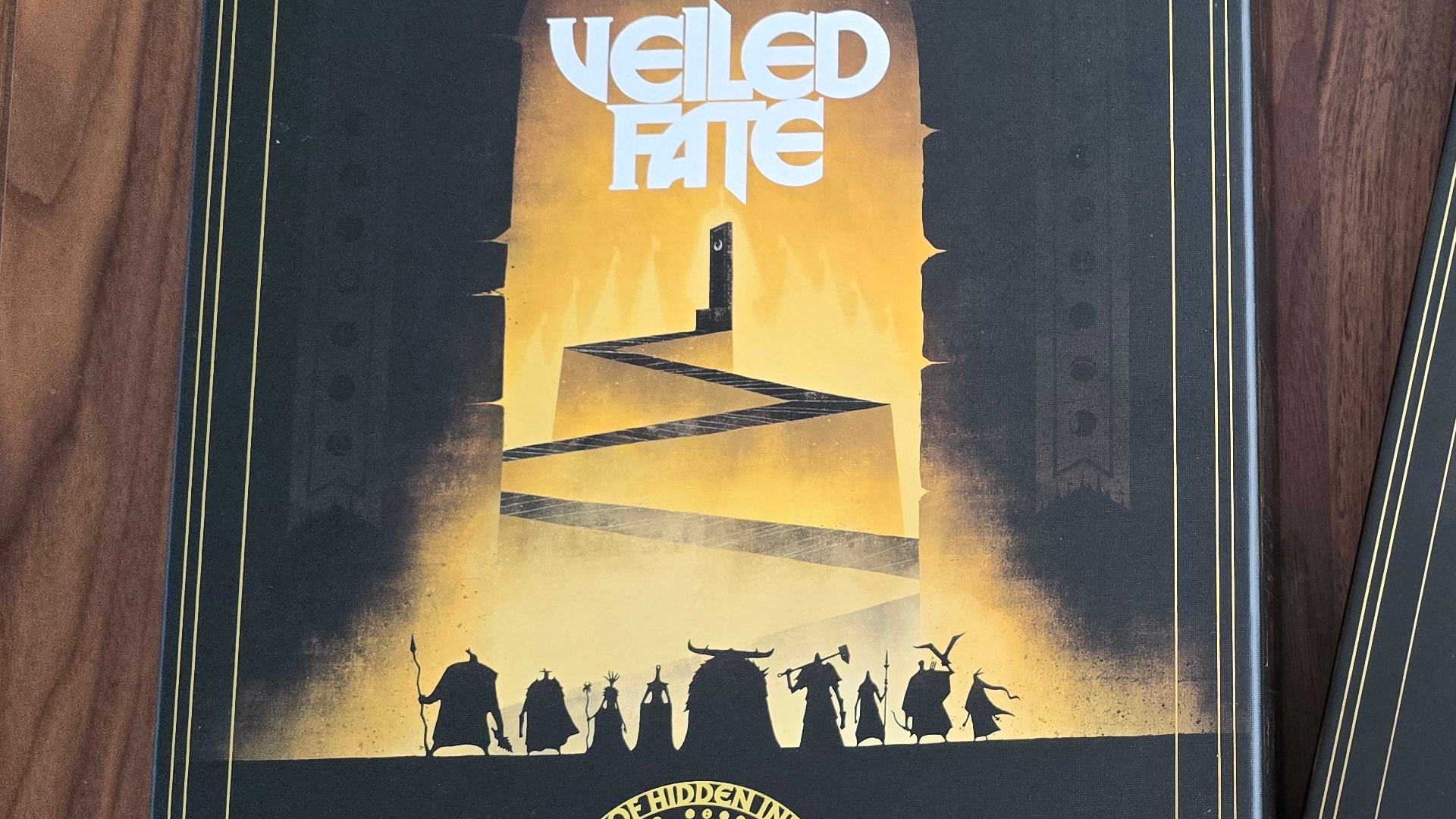Iron Man 3: Director Shane Black Interview
With bonus footage of Black from the Iron Man 3 UK press conference describing how to make the third film in a trilogy that’s not really a trilogy…
Iron Man 3 writer/director Shane Black has long been considered one of the pioneer screenwriters of the modern action genre. He made his breakthrough at the age of 26 when he wrote the screenplay for Lethal Weapon in 1987. Starring Mel Gibson and Danny Glover, the film set up one of the most successful action/comedy franchises of all time. Black subsequently wrote the screenplays for Lethal Weapon 2 , The Last Boy Scout, Last Action Hero and The Long Kiss Goodnight . In 2005, he wrote and directed the well-received Kiss Kiss Bang Bang , which marked the return to the big screen for Robert Downey Jr.
Black has also worked in front of the camera appearing in As Good as It Gets , Predator , RoboCop 3 and Dead Heat . He is producing the upcoming comedy Agent: Century 21 , starring Cameron Diaz and Benicio Del Toro.
First, here’s a clip from the UK Iron Man 3 press conference, then read on for more from Shane Black…
[VAMS id="ghdMgDhX7A56R"]
What was your impression of the first Marvel’s Iron Man as an outsider/friend of the star and not as a filmmaker?
“I was very happy for Robert [Downey Jr] when I found out he was going to be Iron Man. It’s one of those why-didn’t-I-think-of-that? situations where you have certain actors that when you hire them, you get what you pay for. With Robert you never quite know what you’re getting but he always seems to elevate the material and that’s what’s great about him.
“Robert came to me early on with Jon [Favreau]. They had a version but they were looking for some ideas. I like to think I contributed very little. I just sat and talked with them about the movie. I was impressed just how gung-ho they were to do this thing in kind of a realistic style and make a real-world film, not just a comic book film.
Weekly digests, tales from the communities you love, and more
“Robert elevates anything he takes on. He is one of those people who is very personal about it. He’s very passionate and intense about not just giving you a performance you recognize from his last performance. I think he’s one of our great actors and the idea that he can do something that is as intimate and wonderful as Chaplin and then also do Iron Man and not be cynical about it, is remarkable. But Robert is Iron Man; he really committed to it.”
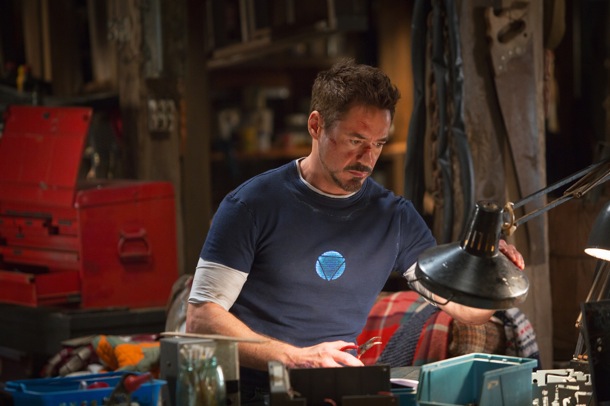
What was it like as a director working with an actor who is so involved in the film making process like Robert Downey Jr?
“Robert shows up to play ball, and you’ve got to be pretty alert in the morning, which I’m not generally. I remember standing outside his trailer like jumping up and down a couple times, gulping down coffee because I knew I had to go in and face this guy. No matter where you go in the room he’s going to be two inches away from your face. He has his ideas and we collaborate, and we’ve done it before, but he’s a force of nature to be reckoned with.
‘He’s an adult. He’s a child. He’s a genius. He can be the most hyperactive, kinetic guy who is limitless in his energy. Basically he’s a phenomenon. He’s remarkable to work with, and he shows up to play. You’ve got to be on your game, because when he walks in, it’s not about chewing the fat and drinking coffee. He wants to go. And so, that was our challenge – just to be ready on set for him. When he walked in, we had to be up to it.”
Does Robert Downey Jr motivate your filmmaking process?
“Yes. When you want someone to trust you, you can’t be lazy and you can’t slack and when you want someone to trust you as much as I wanted Robert to trust me, it forced me to perform at a certain level. I didn’t want to disappoint. I didn’t want him to see me as unwilling to do something I was asking him to do. So I had to step up. Robert is the kind of actor that challenges you in a way that’s not antagonistic; it’s exciting. I’ve always said that it’s probably better to hang around people you admire instead of people who admire you.
“It keeps you on your toes and it keeps thing fresh and hanging around Robert keeps me on my toes. It’s just a really challenging and invigorating kind of creative relationship. I feel he brings out my best because he has the grace to believe in me.”
“Drew Pearce, my co-writer, and I went hog wild
when we were told that there should be extra suits!”
More of this interview on the next page…
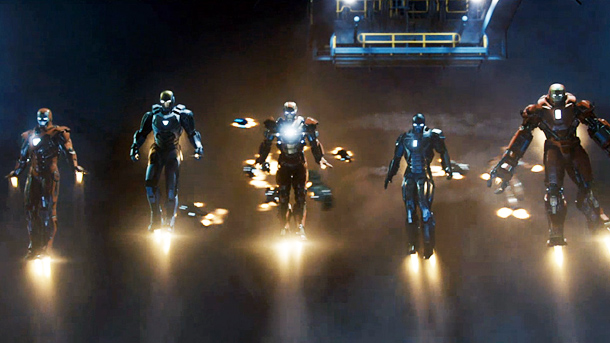
What attracted you to Iron Man?
“My initial exposure to Iron Man was probably early ’60s. I was addicted to those old superheroes, especially the Hulk and Iron Man but more so Iron Man because he was high-tech and cooler. I also had this love of robots. I love robots that look like Iron Man and that sort of meld in like cyborgs. I loved The Six-Million Dollar Man or what it could have been. So there’s always this sort of Michael Crichton high-tech love I’ve had for that sort of superhero.
“Tony Stark has so many troubles, so many foibles, but only later on did I come to appreciate that. That’s what makes the character such a tight fit with Downey and it’s what I respond to now. Once you have everything, what do you really have and as you sit there sipping your champagne, looking out the huge plate-glass window at the world you essentially own, what’s really going on in your head? All the firepower in the world at your disposal and you’re hanging with chicks getting drunk. It’s a level of fantasy that I think people really respond to because here is a guy who maintains a conscience even though he essentially has the ability to be a robber baron. He comes around and he says, ‘No, I still have the responsibility to do the right thing.’”
Tony Stark is grounded in reality and that’s what makes his character so relatable to the audience, correct?
“I think so. One of the great rules of screen writing that I learned a long time ago was people tend to respond to not just folks who do their job pretty well but the people who are the best at what they do. They want to watch people who are the best at what they do and when they see a guy who is so driven and whose mind works so quickly that he’s already three-steps ahead all the time, they are intrigued by just that degree of obsessiveness. But it’s burning within him; this intensity to unconsciously, almost effortlessly, be the best at what he does.”
In what direction do you take the Tony Stark character in Iron Man 3 ?
“In The Avengers there’s a bit of an otherworldly element. There’s kind of a fantasy element and it gets very big and almost flamboyant in its sci-fi aspect. There was an idea to back off a little from that with Iron Man 3 and say that this is a standalone movie. We’re not saying that this is not the same Avengers universe. We’re saying, ‘Okay, he did that last summer but this summer maybe he’s concerned with something a little less extraterrestrial.’ But at the same time, to make it a thriller that has that pulp element to it, it still has to be framed in terms of the comic book. I think we have a creepy type of menace in this one that is sort of outlandish and comic book but also backed up against a real world environment of international war, international arms and international terror.
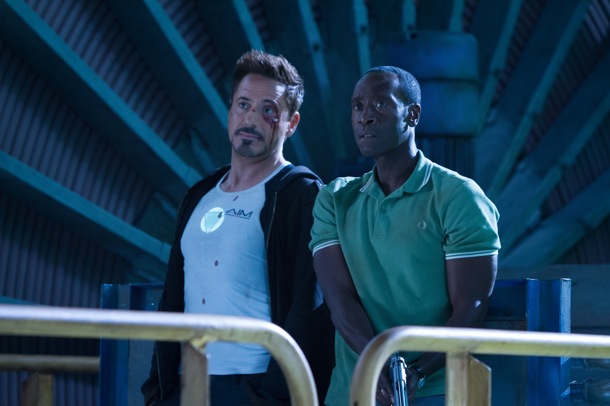
In terms of pacing, is it up-against-the-wall/ticking clock timing in Iron Man 3 ?
“This movie is sort of a crisis movie, which means there’s an ncitiing event. You see some swirling around and pieces that you’re introduced to and you don’t know quite what they mean or how they’re going to fall together, but once the inciting event draws them together, you’re shot off and you rocket along towards the finale. It’s probably about 48 hours or maybe three days for the whole thing, and it’s sort of a headlong rush and in the midst of it I’d like to think that the ‘crucible element’ is that we take Tony Stark and we sort of break him down and we put him through the ringer. There are parts in this movie where he’s not so much in the Iron Man suit and that’s a lot of fun too, when you see him do some action stuff, not as Iron Man, but as Tony. It’s part of him being broken and having to reassess things, and then stand back up and reclaim what’s his by the end of the movie. But that journey and that crucible I think is what’s going to be fun because we’re going to see Tony Stark, within the course of just a few days, put through the paces. And Robert Downey Jr’s just the one to bring that sort of a thing to life.”
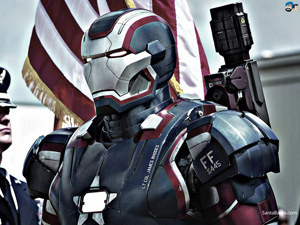
How far did you go with the Iron Man suit? How many are there?
“At the beginning of this movie there are 42 suits. The newest one is based on a technology that was sort of hinted at in the comics, but we do it a slightly different way. Tony has basically put little outlets subcutaneously beneath his exterior layer of skin that can draw the suit to him when he wants it, so it’s still rock solid, still protects him from bullets, but it’s also flexible enough so that he could just throw the suit off him at someone else. I remember Drew Pearce, my co-writer, and I went sort of hog wild when we were told that there should be extra suits.”
How did you interpret the Mandarin, Tony Stark’s greatest foe from the comic books?
“From the very beginning we were all about a real world interpretation of the Mandarin. I hate to break it to you, but he’s not from space and the rings are rings. There is showmanship. There are accoutrements – paraphernalia from warfare that he sort of drapes himself with. He studies insurgency tactics; he surrounds himself with dragons and symbols of warlords and Chinese iconography because he wants to represent this sort of prototypical terrorist. So he’s the ultimate terrorist, but he’s also savvy; he’s been in the intelligence world, he knows how to use the media. He is the terrorist that represents all terrorists. And taking it to a real world level like that was a lot of fun for us.”
Can you talk about creating the style of this film and merging sci-fi and fantastical elements?
“At the same time as it feels a little fantastical, it doesn’t feel unsophisticated and that’s the thing. The task becomes to generate a sci-fi plot that actually does feel real world and fits within the rest of the structure. The actual race to the finish is based on a kind of thriller format. We went for the structure of a thriller, the bigness of a comic book action movie, coupled with the reality and the sophisticated chill of a villain that is frightening in today’s world.”
This is a huge tent-pole movie to direct. What was different for you than doing a movie like Kiss Kiss Bang Bang?
“This was more difficult. There were just more factors, more elements, and more departments to deal with. I learned a lot and I was led sort of by the hand through a process I’d not been familiar with of pre-visualising enormous action scenes with artists and animators. You have a scene where the house falls down and you can’t just show up at the house and go, ‘Okay, knock out that beam, would ya?’ On this film, everything is planned in advance.”
Iron Man 3 is released in the UK on 25 April
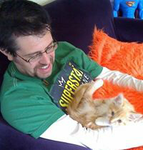
Dave is a TV and film journalist who specializes in the science fiction and fantasy genres. He's written books about film posters and post-apocalypses, alongside writing for SFX Magazine for many years.
